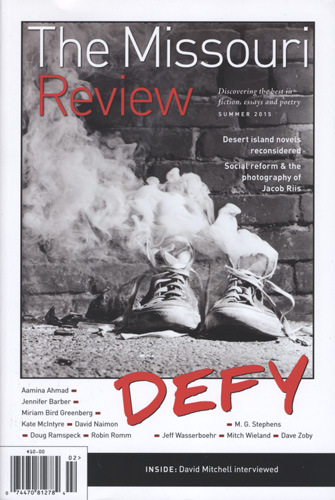The Missouri Review – Summer 2015
The theme of this issue of the University of Missouri’s The Missouri Review is “Defy.” Long-time editor Speer Morgan contributes a five-page introduction, which has this sentence: “The best new voices often defy the accepted in the quest for new themes, subjects and possibilities of form.” He then cites Beethoven, Picasso and Jane Austen, all contemporary cultural staples. Likewise, The Missouri Review is mainstream and established. The writers and artists celebrated in this issue—David Mitchell, Michael West and Jacob Riis—are equally so. The theme of this issue of the University of Missouri’s The Missouri Review is “Defy.” Long-time editor Speer Morgan contributes a five-page introduction, which has this sentence: “The best new voices often defy the accepted in the quest for new themes, subjects and possibilities of form.” He then cites Beethoven, Picasso and Jane Austen, all contemporary cultural staples. Likewise, The Missouri Review is mainstream and established. The writers and artists celebrated in this issue—David Mitchell, Michael West and Jacob Riis—are equally so.
A better approach might be to ignore the theme and focus on the writing. How does it show the behavior of human beings, and the tragic consequences to those who step out of line? This is exactly what the story “July Sun” by Aamina Ahmad does. In rural Pakistan, a young man and woman have an extramarital affair that results in an “honor killing.” Another young couple closely tied to the first try to intervene, and they too suffer. Brutality, kindness, and the natural setting are vivid, and twenty pages are just enough to contain them.
M. G. Stephens’s “The Prodigal Daughter,” set in Ireland, is exactly what the title promises, conventional and Irish. “What to Expect” by Robin Romm is about the artificial insemination and pregnancy of a single woman who is thirty-nine years old. In twenty pages, Romm explores the doubts of the mother-to-be: everything you would expect and nothing original.
“Snow Angels” by Mitch Wieland is longer, but the pages fly. In winter, an American boy living in Tokyo meets a Japanese girl in a park, where they lie on the ground and make snow angels. Each has lost a parent, and each has something to teach the other. It’s a sweet story of first love tempered by the ache of grief, with smart dialogue, and wonderful things like a grove of pine trees, a pack of pink-clad girls on bicycles, and Yoshimi’s red underwear, which she calls “my scarlet round rump on a field of pure white, like our glorious national flag.”
Poetry is presented here as sets of four to six poems by three poets. Miriam Bird Greenberg likes images of disaster and poverty, which she pastes on the page as into a scrapbook. Jennifer Barber likes white space, where she allows a stray thought such as this: “The moon a doorknob to a dark / so large no one can see it.” In contrast to these two, Doug Ramspeck deftly employs images of clouds, smoke, wind-blown dust, and flying bats to summon emotion: “this russet stain of day amid the willows, this clot in the throat.”
In nonfiction, Dave Soby tells about his experience years ago as a greasy-spoon dishwasher in “Hobart Dreams.” Kristine Somerville surveys the well-known life and work of Jacob Riis, who photographed, lectured and wrote about New York slum dwellers in the late 1800s. David Naimon, based in Portland, Oregon, interviews the British writer David Mitchell, who lives in Ireland. (No travel is mentioned—did they talk by phone?) Mitchell is “best known for his intricately plotted novels,” such as Cloud Atlas (2004) and last year’s The Bone Clocks. Naimon worships as a fan, and Mitchell comes across as condescending. Surely, neither of them meant for this to happen. Further editing might have helped.
Kate McIntyre writes an appreciation of four books called “The Desert Island Novel.” McIntyre is serious about a subject that invites daydream, but she is excellent company for all that. To the bumpy ride of this issue of The Missouri Review, she provides a smooth landing.
[www.missourireview.com]





